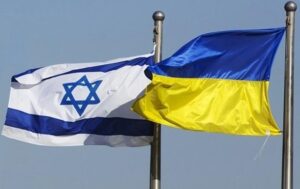
Israel will send several tons of medicines to Ukraine in the coming days at the request of the Ukrainian side, Israeli Ambassador to Ukraine Michael Brodsky said.
“Today there was a conversation between the health ministers of Israel and Ukraine. In the coming days, at the request of the Ukrainian side, Israel will send several tons of medicines to Ukraine,” Brodsky wrote in his Telegram channel on Monday.

Israeli Foreign Minister Eli Cohen has arrived in Kyiv on a visit. This is the first visit of an Israeli high-ranking official to Ukraine since the beginning of the full-scale Russian invasion.
“I have come to say: Israel supports Ukraine and the Ukrainian people in difficult times,” Cohen wrote on his Twitter account.
During his visit, the Israeli foreign minister is scheduled to meet with President Vladimir Zelensky and Foreign Minister Dmitry Kuleba.
Cohen is expected to visit Bucha, Babi Yar and announce the reopening of the Israeli embassy in Kiev, which was closed due to the war.

The work on the transfer of Israeli technologies related to smart alerts for missiles and drones to Ukraine is in progress, said the Ambassador of Ukraine to Israel Yevgeniy Korniychuk.
“Regarding the official things that we can comment – there is work on the transfer of Israeli technology related to smart alerts concerning missiles and drones. This technology is officially being transferred by the Israeli side. And I think that in a certain time we will receive it completely,” he said at a briefing at the Media Center Ukraine.
The Ambassador added that Ukraine still needs more active military-technical cooperation. However, according to him, there are many projects that cannot be commented on publicly yet.
“In order to have specifics on Iranian drones, I think it will take a few weeks. Since the government has just started work, it needs to make a decision taking into account the position of the U.S. as a major strategic partner, and the interests of the public,” the ambassador said.
He explained that the gap between the right-wing bloc that came to power and the left-wing forces is very small – 40 thousand voters, and the agenda is very much related to domestic politics, as well as the Palestinian question.
“So the issue of Ukraine is not a priority. Although we are trying with all our might to make it so,” Korniychuk added.
At the same time, the Israeli Foreign Ministry said that the issue of the war in Ukraine is a priority, said the Ukrainian diplomat.
“The minister said that he would facilitate more aid to Ukraine, without specifying it,” the ambassador said.

Israeli President Yitzhak Herzog on Sunday officially instructed right-wing leader Benjamin Netanyahu to form a government, the Jerusalem Post reported.
Netanyahu arrived at the Duke’s official residence on Sunday, where the official handover ceremony took place.
Now Netanyahu has 28 days to form a new government in the country. If he fails to complete the task on time, he may ask for an additional 14 days. If he fails to meet the extra time, then the president can transfer the mandate to another candidate.
However, with a high probability, Netanyahu will be able to achieve the approval of parliamentarians – there are 120 seats in the Knesset, among them the bloc of right-wing and religious parties has 64 mandates. The approval of 61 deputies is required for the Knesset to approve the composition of the government. Just 64 deputies recommended President Herzog to give a mandate to Netanyahu, and not to another candidate.
The fact that the mandate will receive Netanyahu, it became known earlier this week. He was in opposition for about a year and a half, but in the November 1 elections, his Likud party won the majority of votes, and together with other right-wing parties, he managed to win an advantage over the left that came to power in the previous elections.

The opposition Likud party and its partners in Israel’s right-wing bloc may win a parliamentary majority in Israel’s parliamentary elections, The Jerusalem Post reports, citing polling results at the exit from polling stations.
Netanyahu’s bloc, which includes the Likud, the Religious Zionists, the single list of ultra-Orthodox parties Yahadut HaTorah and the ultra-religious Shas, can win 61 seats out of 120, according to exit polls. The Times of Israel predicts that the bloc Netanyahu will have 61-62 seats, Channel 12 predicts that the Netanyahu bloc will have 61 seats, Channel 13 – 62 seats, while the bloc of current Prime Minister Yair Lapid, according to the exit polls of these two channels, has 54-55 seats.
According to the Channel 12 exit poll, the Likud party, led by Netanyahu, could get 30 seats. According to the Channel 13 exit poll, Likud could win 31 seats. Lapid’s Yesh Atid party won 24 seats, according to exit polls from both channels.
However, the balance of power after the counting of all votes may still change, but the Israeli media is generally inclined to believe that, following the results of the current elections, Netanyahu may be able to regain power and become the head of government again. The final results will be known in the coming days, but by Wednesday morning, with the exception of some details, it will already be clear what the balance of power in the 25th Knesset will be, media say.
Polling stations in Israel closed at 22:00 (22:00 Kyiv time). The Israelis elected a new unicameral parliament, the Knesset.